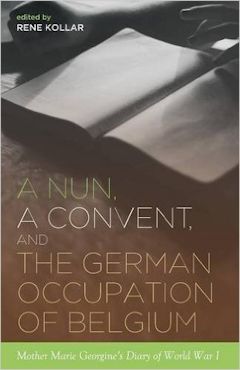
|
January 16, 2017
A Nun, A Convent, and The German Occupation of Belgium Edited by Rene Kollar Pickwick Publications. Eugene Oregon. 2016. Pp. 100
World War 1 has been recorded from many points of view: correspondent, poet, politician and soldier. Comments from a nun living in a foreign country during the hostilities, however, can provide new insights. Isoline Jones was born in 1876 in England, and attended the boarding school of Tildonk, Belgium, run by Ursuline sisters. She eventually converted to Roman Catholicism from Anglicanism and made her perpetual vows in 1907 as a member of the Ursuline community. Her religious name was Mother Marie Georgine. In August 1914, German forces invaded Belgium and occupied the convent and school, and her impressions of the war years are preserved in a series of letters written in the form of a diary. The siege of Antwerp, the plight of refugees, interaction with the German soldiers, and the hectic daily life of the convent were recorded by Mother Marie Georgine. Events occurring throughout Belgium did not escape her attention, and she did not avoid describing the brutality of war. Although sections of her diary have appeared in print, this is the first publication of Mother Marie Georgine's entire diary. Her impressions of World War 1 offer new perspectives on this tragic event. An Excerpt from the Book: February 20, 1918 Some weeks ago I had to take one of the nuns to Louvain to undergo a very serious operation. It was to take place at 7:30 or 8:a.m. on Monday morning, but not professor arrived to perform the operation. We thought it very queer and finally his assistant went to his house to enquire and received as a reply that he had gone to Brussels on Saturday afternoon, was due home on Sunday evening but had not arrived. No doubt he had lost his train and would probably be home by midday. We waited and waited but no professor arrived and finally about 2:30 we gave it up as a bad job and returned home very vexed but fully expecting to receive a letter full of abject apologies. Nothing came and at last we heard quite by chance that he was in prison. He had been sent for by a Doctor in what they call the "Etape" (the part of the country so near the line of fire that nobody may come or go without a special permit) to perform an urgent operation. He applied for a passport but didn't get it and the doctor at the other end sent a telegram for him to come at once so he decided to risk it. Unfortunately he was caught and sent to prison as well as the doctor who had sent for him. It was 10 days before he was able to persuade them he was not a spy. He is a very celebrated Surgeon and there is practically nobody to replace him as so many young doctors are with the army. Table of Contents: 1. August 16, 1914 -- December 20, 1914 2. January 3, 1915 - December 29, 1915 3. March 13, 1916 - November 18, 1916 4. June 28, 1917 - December 28, 1917 5. February 20, 1918 - December 17, 1918 |
|
